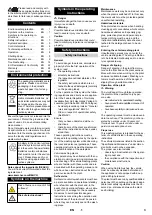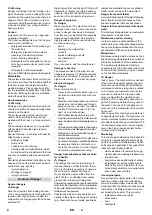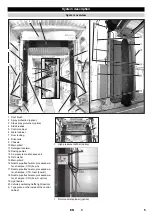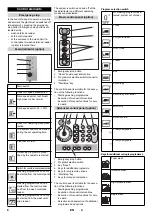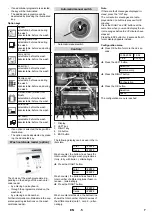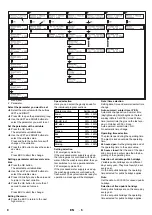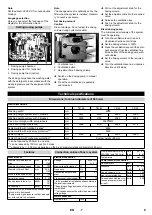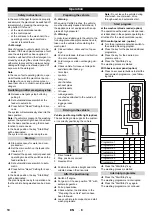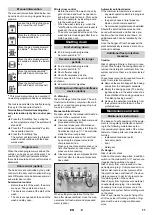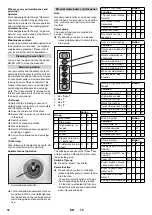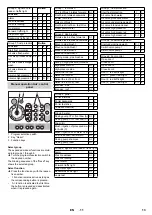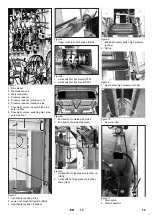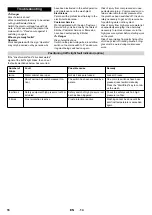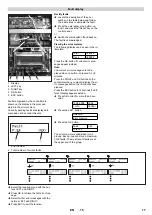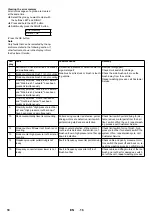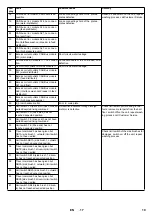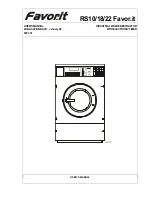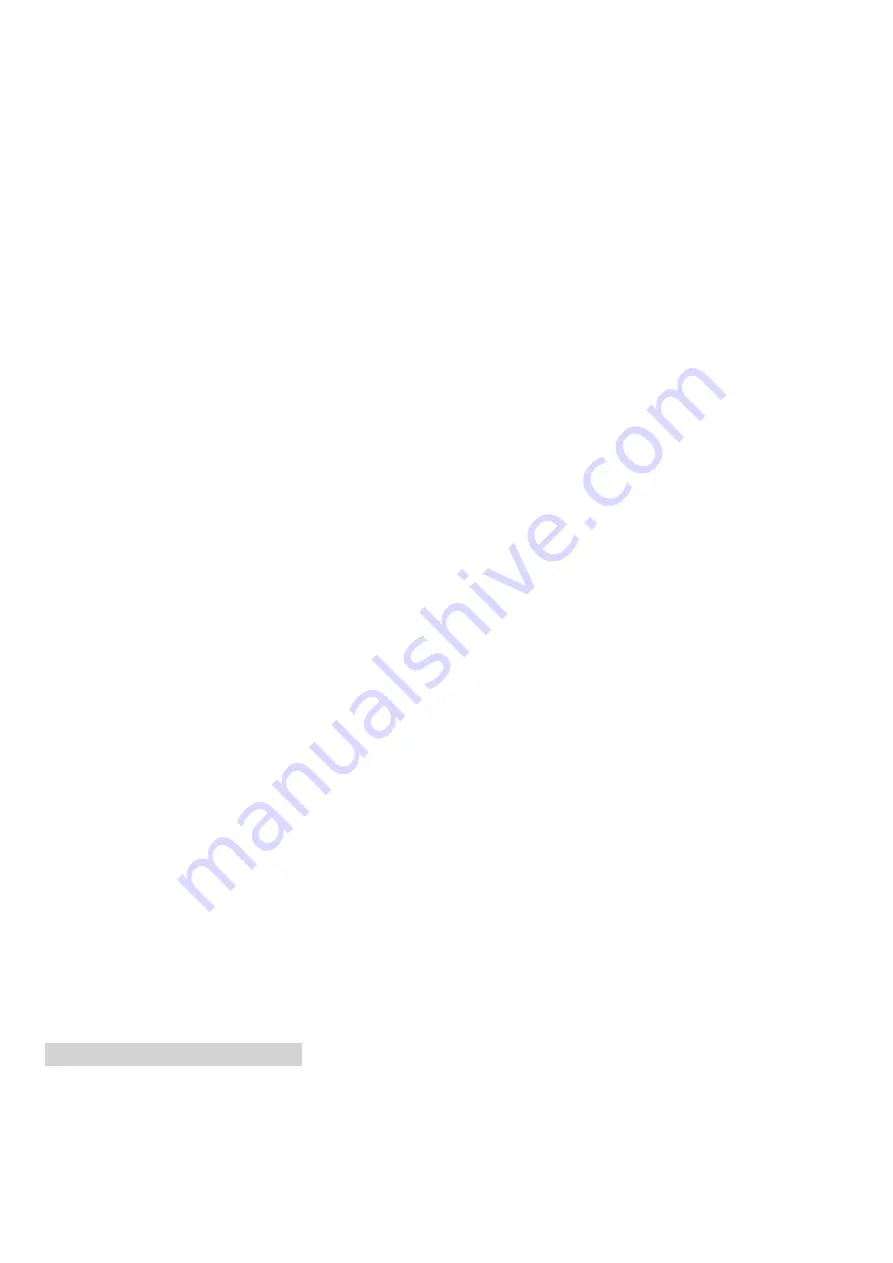
-
2
몇
Warning
Danger of damage from ice forming in the
plant. The water must be drained from the
system and the supply line when there is a
danger of frost. The circulation routes for
customers using the washing plant must re-
main slip-resistant (e.g. using underfloor
heating, gravel).
Caution
Increased risk of corrosion by using inap-
propriate detergents.
The following detergents must not be proc-
essed by the installation:
–
detergents intended for the cleaning of
the wash hall.
–
detergents intended for the exterior
cleaning of the washing system.
–
Acid-containing detergents.
–
Detergents which are applied to the ve-
hicle by a separate device (such as rim
cleaners).
–
Detergents to treat wastewater.
Only use KÄRCHER-approved detergents.
The system is shut down at the control pan-
el. In some countries, the law demands that
the driver leaves the vehicle during the
washing process. Please enquire and fol-
low the regulations applicable at the instal-
lation site. Entering the plant is prohibited
during the washing process.
몇
Warning
Damage to property! Failure to keep to the
vehicle size limits can cause damage to the
vehicle and the plant.
The portal washing system must not be
used to clean vehicles that cannot be
washed with the brush, i.e. for special vehi-
cles.
These vehicles, however, can be washed
without a brush with the high pressure
wash option.
Special vehicles, i.e. vehicles with special
attachments, such as
–
Rubbish vehicles
–
Dump truck
–
Tankers and silo vehicles
–
Vehicles with roof attachments, which
protrude over the windshield in the front
can only be washed with manual interven-
tion.
Should the above-stated instruction not be
observed, the vehicle wash plant owner is
not liable for any resulting
–
injury to persons
–
damage to property
–
injury to animals.
Danger
Risk of eye injuries from leaking air pres-
sure. The pneumatic parts of the plant still
remain under high air pressure after the
main switch or emergency switch has been
switched off.
Risk of injury from parts flying off! Flying-off
fragments or objects can injure people or
animals. Therefore the hall floors must be
kept clear of loose objects lying around.
Danger
Risk of explosion! The plant must not be
operated in the near to rooms that are ex-
posed to danger of explosion. Excepted
from this are only plants that are explicitly
intended and designated. No explosive,
highly ignitable or poisonous substances
must be used, as e.g.:
–
petrol
–
heating oil and diesel fuel
–
solvents
–
liquids containing solvents
–
non-diluted acid
–
acetone
If you are unsure, ask the manufacturer.
The noises emitted by the plant are not
dangerous. However, if parts that amplify
sound are shot blasted, it can give rise to
higher noise levels. If so, wear ear plugs.
Danger
Risk of electric shock.
–
Never touch electrical cables, plug con-
nections and terminal boxes with wet
hands.
–
Electrical connecting leads or extension
cables must not be damaged through
being driven over, crushed, or pulled or
the like. Protect the power cord from
heat, oil, and sharp edges.
–
With mobile cleaning devices (e.g. with
high-pressure cleaners) the water jet must
never be aimed at electrical appliances or
units.
–
All current-conducting parts in the working
area must be protected against jet water.
–
Plants must only be connected to proper
earthed power sources.
–
All work on electrical parts of the plant must
be carried out only by a qualified electrician.
–
Accessories that are not directly con-
nected to the system, must be integrat-
ed into the equipotential bonding.
Danger
The detergents used contain partly sub-
stances that are harmful to health; there-
fore it is absolutely necessary to observe
the enclosed or printed instructions.
Do not drink the water emitted from the
plant! There is no drinking water quality
present due to the mixed detergents.
Should processed water be used to operate the
plant, then the stipulations of the manufacturer
of the water treatment plant on germination in-
hibition must be observed.
Substances which do not generally occur
usually in the exterior cleaning of vehicles
(e.g. chemicals, heavy metals, pesticides,
radioactive materials, faeces or epidemic
matter) must not reach the wash plant.
An uncontrolled restart of the plant following
power failure is ruled out because of con-
struction measures that have been taken.
The locally valid regulations on waste water
disposal are to be observed.
In order to ensure a safe operation of the
plant and to prevent dangers during mainte-
nance, monitoring and inspection, the corre-
sponding instructions have to adhered to.
Maintenance work must be carried out by a
specialist at regular intervals in accordance
with the specifications of the manufacturer.
The existing stipulations and safety re-
quirements are to be here observed. Work
on the electrical plant may only be carried
out by qualified electricians.
Danger
Risk of injury. The plant must be switched
off and secured against against any unin-
tentional and unauthorised restart before
maintenance and servicing can be carried
out. Air pressure containers and air pres-
sure lines continue to be remain under
pressure also after the plant has been
switched off. It is absolutely necessary to
get rid of pressure before starting work on
the plant. Then check for the absence of
pressure on the manometer at the mainte-
nance unit.
Risk of injury from high-pressure water jet
unexpectedly emerging. The high pressure
system continues to remain under pressure
also after the plant has been switched off. It
is absolutely necessary to remove all pres-
sure in the high-pressure system before
starting work on the plant.
This vehicle wash plant must be inspected
for its safe operational state before being
put into operation and afterwards at least
half-yearly by a specialist. The scope of this
inspection specifically includes:
–
visible inspection for externally recog-
nisable wear and damage respectively
–
Function test
–
completeness and effectivity of safety
installations for self-operation plants
daily before start of operation, for mon-
itored plants according to requirements
but at least once monthly.
Use exclusively original parts of the manu-
facturer or those parts recommended by
him as otherwise claims made under the
warranty will be rendered void. Observe all
instructions on safety and use which are
accompany these parts. This concerns:
–
replacement and wear parts
–
accessories
–
Fuel
–
detergents.
Workstation
Non-intended use
Sources of danger
General dangers
Danger of explosion
Damage to hearing
Electrical dangers
Danger from substances that are harm-
ful to health
Danger from power failure
Danger to the environment from waste
water
Maintenance and monitoring
Maintenance
Monitoring
Use original parts.
4
EN
Summary of Contents for TB 36
Page 1: ...TB 36 TB 42 TB 46 TB 50 59637510 1 2 02 19 ...
Page 2: ...2 ...



